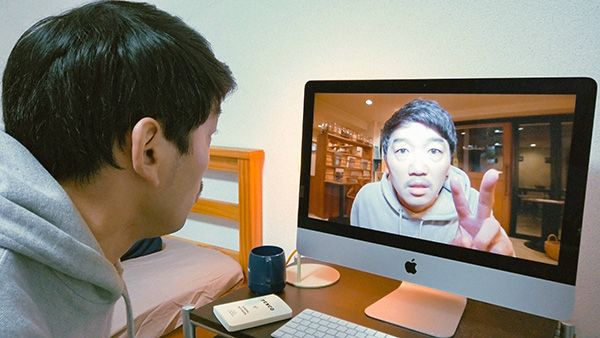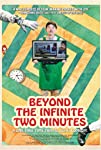Eye For Film >> Movies >> Beyond The Infinite Two Minutes (2021) Film Review

If you’ve ever played around with video monitoring of a nearby space, you might have been amused by seeing yourself on camera, after getting back to the control booth, due to a delay. Sometimes this happens by accident and it’s no big deal once you realise what’s up. But what if the you whom you were watching was not in your past, but in your future? Kato (Kazunari Tosa) has left his café for the night and gone upstairs to his apartment when he turns on the TV to receive a message from himself, standing back in the café in two minutes’ time. It’s the beginning of the strangest night of his life.
What would you do in that situation? Kato rushes downstairs, as much out of curiosity as anything else, and is unsurprised to find himself delivering the message he just received because, well, that’s what he just said. Soon he is joined by friends, one of whom worries that failing to do what they’ve just seen themselves do could cause something terrible to happen, though nobody can provide any logical support for that. Ideas come quickly and the situation is so unexpected and exciting that nobody rally stops to think it through – at least not until bad things do start to happen, for a different reason.

High concept films like this can easily go awry, but Makoto Ueda’s script somehow manages to stay on the ball throughout. It gets more and more complicated without ever losing its internal cohesion. Director Junta Yamaguchi also excels in staying on top of the frantic action, shooting tightly choreographed takes which sometimes run for 20 minutes or more. The result is sometimes exhausting to watch – if you’re tired at the outset, don’t even try – as constant attention is required to keep up with all the twists and turns (physical as well as narrative), but the characters’ enthusiasm is infectious and will help to carry you along. There’s also a good deal of high-spirited comedy which belongs to a distinctly Japanese tradition but translates well enough. It was a natural fit for Fantasia's 2021 line-up.
What really makes this, however, is not its structural cleverness or wit but the way it handles character dynamics and underlying themes. Despite the hectic pace we get to know at least a little bit about each of the characters and how they work together as a group, as well as seeing them interact with newcomers such as the neighbour whom Kato has a crush on. Having to face the future – even if it’s only two minutes away – helps Kato to face his anxieties and discover reserves of courage. He becomes less intimidated by change, ready to re-evaluate his priorities. This happens in an organic way without distracting from the action and allows for a tonal shift at the end when we are suddenly brought face to face with something which has been developing in the background for some time. It’s a sweet conclusion to a sweet little film which proves that you don’t need to be cynical to be sharp and that, whilst foresight (and hindsight) is useful, sometimes what people need most is to look again at what’s right in front of them.
Reviewed on: 17 Aug 2021















